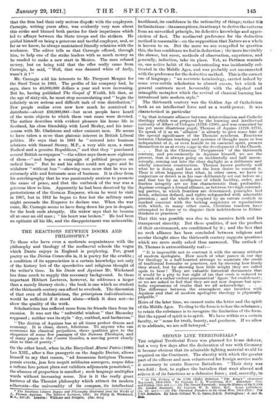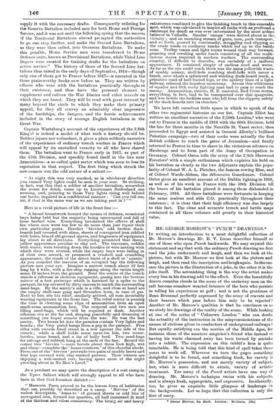SECOND LINE TERRITORIALS.*
T313 original Territorial Force was planned for hcme defence, but a very few days after the declaration of war with Germany it became obvious that its admirable fighting material would he required on the Continent. The alacrity with which the greater part of its officers and men volunteered for foreign service made it necessary to create Reserve Battalions. " Their duty was two-fold : first, to replace the battalion that went abroad and relieve it of its functions as a defensive force ; and, secondly, to • (1) The History of the 21611s (Rip) Battalion "The Ring's" (Liverpool Regime's!), 1914-1919. By Captain 0. B. Wurtzburg. M.C. Aldershot : (laia and Polden. [21s. net.)—(2) The Second Twentieth : being !lee History of the 2/201h Be. London Regiment. By Captain W. It. Elliot. li.C. Same publishers. 15s. 6d. net.)—(3) The Sherwood Foresters in the Great War. 1914-1018 : The 2/8th Battalion. By Lieut.-Colonel W. C. Oates, D.8.0. Nottingham : J. and 11.
supply it with the necessary drafts. Consequently enlisting for the Reserve Battalion included men for both Home and Foreign Service, and it was not until the following spring that the success q the Territorial Battalions abroad prcmpted the authorities to go one step further, and make the Second Line Battalions, as they were then called, into Overseas Battalions. To make this possible, Home Service men were transferred to Hcme Defence units, known as Provisional Battalions, while Third Line Depots were created for training drafts for the battalions on active service." The history of three of the Second Line bat- talions thus raised in the early days of September, 1914—though only one of them got to France before 1917—is narrated in the three praiseworthy books now before us. They are written by officers who were with the battalions practically throughout their existence, and thus have the personal element to supplement and enliven the War Diaries and other records on which they are based. They will be read with great interest by many beyond the circle to which they make their primary appeal, for they all convey an admirably clear impression of the hardships, the dangers, and the heroic achievements included in the story of average English battalions in the Great War.
Captain Wurtzburg's account of the experiences of the 2/6th King's'. is indeed a model of what such a history should be. Neither jejune nor redundant, it gives a plain soldierly narrative of the experiences of ordinary trench warfare in France which will appeal by its unstudied veracity to all who have shared them. The battalion went to France early in 1917, as part of the 57th Division, and speedily found itself in the line near Armentieres—a so-called quiet sector which was soon to lose its reputation in that respect. The first thing which struck the new-comers was the odd nature of a salient :-
" At night this was very marked, as in whichever direction you turned Very lights could be seen in your rear. So striking, in fact, was this that a soldier of another battalion, somewhat the worse for drink, came up to Lieutenant Sutherland one evening, and, pointing to those Very lights rising well behind our backs, inquired in a confidential manner ' Can you tell me, sir, if that is the same war as we are taking part in ? ' "
Here is a vivid picture of life in the front line :-
" A broad breastwork formed the means of defence, occasional bays being held but the majority being unoccupied and full of loose barbed wire. Everything betokened the effects of shell fire where men were too few to do more than just repair their own particular posts. Derelict bivvies,' odd broken duck- boards half covered with slime, sheets of corrugated iron riddled with holes, bits of old ground sheets, and fragments of equipment lay about in all directions. Everything presented that damp, yellow appearance peculiar to clay soil. The traverses, sodden with water, were bursting down the hurdles or wire netting with which they were riveted, while the empty bays were falling in of their own accord, or presented a crushed and crumbling appearance, the result of the direct burst of a shell or minnie.' As you rounded the traverse of an occupied bay the following picture met your eye. Imagine a narrow trench about 12 feet long by 4 wide, with a fire-step running along the entire length some 12 inches from the ground. Near the centre of the trench stands a rifleman in skeleton equipment, gazing into the bottom mirror of a box periscope which is fastened by a spike to the parapet, its top covered by dirty canvas to match the surrounding sand-bags. By the sentry's side is a rifle, and close at hand are the empty shell-case gong and Strombos horn, in case of gas. Next to him sits his relief, similarly attired, all men invariably wearing equipment in the front line. The relief sentry is passing the time in cleaning some clips of ammunition from an open small-arms ammunition box. The corporal and two men are filling sand-bags, which will be required at dusk. Another rifleman sits at the far end, sleeping peacefully and dreaming of something (we hope) remote from the war. He was the last sentry. Two boxes let into the parados contain Very lights and bombs ; the Very pistol hangs from a peg in the parapet. Five rifles with swords fixed stand in a row against the side of the trench ; while a shelf holds some mess-tin lids, two water- bottles, some bread, and a tin of bully beef. Two sand-bags -for salvage and rubbish hang at the ends of the bay. Round the corner two bivvies '—mere hovels about three foot high, wet and slimy—complete the ' home comforts ' of this cheerful abode. From one of the bivvies ' protrude two pairs of muddy boots and four legs covered with clay-stained puttees. Their owners are enjoying a well-earned rest, having spent most of the night prowling about in No Man's Land."
As a pendant we may quote the description of a rest camp in the Ypres Salient which will strongly appeal to all who have been in that God-forsaken district :— " Marsouin Farm proved to be the lowest form of habitation that can possibly be described as a camp. Bivvies ' of the rudest description, leans-to ' of ground sheets or odd bits of corrugated iron, formed our quarters, all half immersed in mud of the thickest and vilest consistency. The biting air and heavy rainstorms combined to give the finishing touch to this execrable spot, which was calculated, to inspire all ranks with as profound a contempt for death as was ever entertained by the most ardent believer in Valhalla. Similar ' camps' were dotted about in the vicinity ; and an unending stream of guns, men, pack transport, and so forth, poured by continually, struggling and slipping on the crude roads or corduroy tracks which led up to the battle zone. Trolley trams and light trains wound their way forward, grunting and creaking under loads consisting of all the multi- farious stores required in modern warfare. The surrounding country, if difficult to describe, was certainly of a uniform appearance. It consisted simply of endless mud and water. As far as the eye could reach there was the same yellowish waste of muddy misery, shell-hole touching shell-hole with never a break, save where a splintered and winding duck-board track, a primitive road of half-buried logs, or the spidery lines of a light tailway, relieved the hopeless monotony. Across this wilderness of squalor and filth every fighting man had to pass to reach the enemy. Ammunition, rations, R. E. material, Red Cross stores, everything, in fact, had to be transported over this quagmire, and woe betide the luckless man who fell from the slippery safety of the duck-boards into its clutches."
We have left ourselves little space in which to speak of the other two regimental histories on our list. Captain Elliot has written an excellent narrative of the 2/20th London,2 who went
out to France in the middle of 1916 with the 60th Division, held the line for three months in the Neuville St. Vaast sector, then proceeded to Egypt and assisted in General Allenby's brilliant Palestine campaign—two of their cooks were actually the first British soldiers to reach the gates of Jerusalem—and finally returned to France in time to share in the victorious advance on Maubeuge and to form part of the Army of Occupation in Germany. Colonel Oates tells the story of the 2/8th Sherwood Foresters' with a simple enthusiasm which explains his hold on his battalion as -clearly as the two Adjutants explain the popu- larity of Colonel W. A. L Fletcher, the famous rowing Blue, and of Colonel Warde-Aldam, the ddbonnaire Guardsman. Colonel Oates gives an excellent account of the Dublin fighting in 1916, as well as of his work in France with the 59th Division till the losses of his battalion placed it among those disbanded in February, 1918. All three battalions were fortunate in keeping the same zealous and able C.O. practically throughout their existence ; it is clear that their high efficiency was due largely to this fact. The clear and accurate trench and battle maps contained in all three volumes add greatly to their historical value.



































 Previous page
Previous page